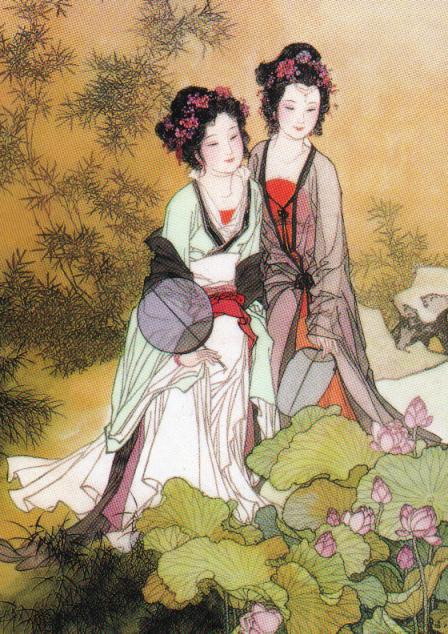During the reign of Emperor Yongzheng, there was a scholar named Cai in Guilin, young and handsome with an elegant demeanor.
One spring, Cai went to the theater to watch a play. While engrossed in the performance, he felt someone touching his buttocks from behind. Enraged, Cai prepared to scold the person and even raised his fist to strike. However, when he turned around, he discovered that the one who touched him was also a young man, even more handsome than himself. Cai’s anger turned to joy, and he extended his hand to touch the young man’s private parts. The young man, pleasantly surprised, quickly adjusted his attire, bowed to Cai, and introduced himself. It turned out that this young man was also from a wealthy family in Guilin, having studied but not yet entered official service. From that moment on, they became inseparable, holding hands and sharing everything. They dressed in clothes with narrow sleeves and tight collars, resembling women to the casual observer. People couldn’t easily tell whether they were men or women.
In Guilin, there was a ruffian named Wang Tuer. Once, he cornered Cai and the young man in a deserted place, attempting to assault them. Refusing to yield, Cai and the young man were murdered by Wang Tuer, and their bodies were thrown into an uninhabited area below the city walls.
Both sets of parents reported the crime to the authorities, and the government ordered the capture of the murderer. The constables found bloodstains on Wang Tuer’s clothes and arrested him. During interrogation, Wang Tuer confessed to the murders and was sentenced to death by the authorities.
Because Cai and the young man were well-mannered scholars, sympathetic people in the village built a temple in their honor. During each ritual, people would offer a branch of apricot flowers, leading to the temple being named the “Double Flower Temple.” Occasionally, locals prayed for help, and their requests were often fulfilled, making the temple popular.
Several years later, a county magistrate nicknamed Liu the Big Mustache passed by the Double Flower Temple and inquired about its origins. Upon learning the details, Liu the Big Mustache became furious, declaring it a debauched shrine and questioning why two rascals were being worshipped. He immediately ordered the local authorities to demolish the temple.
That night, Liu the Big Mustache dreamt of the two deceased individuals confronting him. One grabbed his mustache, while the other spat in his face, scolding him, “On what basis do you call us rascals? You’re an official, not our servant. How would you know what happened between us in private? In the Three Kingdoms era, Zhou Yu(周瑜) and Sun Ce(孫策) were both handsome young men. They were close friends, sharing a room and sleeping side by side. Yet, they became heroes of their time. Do you also consider them rascals? Since you became the county magistrate of Guilin, you’ve mishandled cases, engaged in corruption, taken bribes, and wrongfully killed Zhou Gongsheng one year. Aren’t you the real villain, while we are not? We initially intended to end your life immediately, but knowing your imminent death due to your own wrongdoing, we spared you for now!” Finishing their words, they pulled out a three-foot-long wooden stick from their sleeves, tied it to Liu the Big Mustache’s hair, saying, “Wait and see; you’ll understand soon enough!”
Liu the Big Mustache woke up from the dream, recounting the details to his family. Fearful, his family suggested rebuilding the Double Flower Temple and honoring Cai and the young man. However, due to pride, Liu the Big Mustache remained silent about the temple’s reconstruction. Shortly after, his corrupt practices were exposed, and he was impeached by the imperial censors. The emperor issued an edict, sentencing him to death by hanging. In his final moments, he realized that the stick in the dream symbolized the noose.
Translated from《雙花廟》in 《子不語》:
雍正間,桂林蔡秀才,年少美風姿。春日戲場觀戲,覺旁有摩其臀者,大怒,將罵而毆之。回面,則其人亦少年,貌更美于己,意乃釋然,轉以手摸其陰。其人喜出望外,重整衣冠向前揖道姓名,亦桂林富家子,讀書而未入泮者也。兩人遂攜手行赴杏花村館,燕飲盟誓。此後出必同車,坐必同席,彼此熏香剃面,小袖窄襟,不知烏之雌雄也。
城中惡棍王禿兒伺于無人之處,將強姦焉。二人不可,遂殺之,橫屍城角之陰。兩家父母報官相驗。捕役見禿兒衣上有血,擒而訊之,吐情伏法。兩少年者平時恂恂,文理通順,邑人憐之,為立廟,每祀必供杏花一枝,號「雙花廟」。偶有祈禱,無不立應,因之香火頗盛。
數年後,邑令劉大鬍子過其地,問雙花廟原委,得其詳,怒曰:「此淫祠也,兩惡少年,何祀之為?」命里保毀之。是夜,劉夢見兩人一捽其鬍,一唾其面,罵曰:「汝何由知我為惡少年乎?汝父母官,非吾奴婢,能知我二人枕被間事乎?當日三國時,周瑜、孫策俱以美少年交好同寢宿,彼蓋世英雄,汝亦以為惡少年乎?汝作令以來,某事受枉法贓若干,某年枉殺周貢生某,汝獨非惡人!而謂我惡乎?吾本欲立索汝命,因王法將加,死期已近,姑且饒汝!」袖中出一棍,長三尺許,繫劉辮髮上曰:「汝他日自知。」
劉驚醒,與家人言,將復建廟祀之,而赧於發言。未幾,以贓事被參,竟伏絞罪,方知一棍之徵也。


Comments are closed.